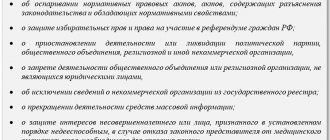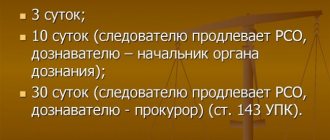1. Robbery, that is, the open theft of someone else’s property, is punishable by compulsory labor for a term of up to four hundred eighty hours, or correctional labor for a term of up to two years, or restriction of liberty for a term of two to four years, or forced labor for a term of up to four years. , or arrest for a term of up to six months, or imprisonment for a term of up to four years.
2. Robbery committed: a) by a group of persons by prior conspiracy; b) the clause became invalid on December 11, 2003 - Federal Law of December 8, 2003 N 162-FZ; c) with illegal entry into a home, premises or other storage; d) using violence that is not dangerous to life or health, or with the threat of using such violence; e) on a large scale - is punishable by forced labor for a term of up to five years, or by imprisonment for a term of up to seven years, with or without a fine in the amount of up to ten thousand rubles or in the amount of the wages or other income of the convicted person for a period of up to one month, and with restriction of freedom for a term of up to one year or without it.
3. Robbery committed: a) by an organized group; b) on an especially large scale, - c) the clause became invalid on December 11, 2003 - Federal Law of December 8, 2003 N 162-FZ - punishable by imprisonment for a term of six to twelve years with a fine of up to one million rubles or in the amount of wages or other income of the convicted person for a period of up to five years or without it and with restriction of freedom for a period of up to two years or without it.
Can a criminal case under Part 2 of Article 161 of the Criminal Code of the Russian Federation be terminated due to the reconciliation of the parties?
Hello. Can a criminal case under Part 2 of Article 161 of the Criminal Code of the Russian Federation be terminated due to the reconciliation of the parties?
Lawyer Antonov A.P.
Good afternoon According to Part 2 of Article 161 of the Criminal Code of the Russian Federation, robbery committed: a) by a group of persons by prior conspiracy; c) with illegal entry into a home, premises or other storage; d) using violence that is not dangerous to life or health, or with the threat of using such violence; e) on a large scale - is punishable by forced labor for a term of up to five years, or by imprisonment for a term of up to seven years, with or without a fine in the amount of up to ten thousand rubles or in the amount of the wages or other income of the convicted person for a period of up to one month, and with restriction of freedom for a term of up to one year or without it. According to Article 15 of the Criminal Code of the Russian Federation, depending on the nature and degree of public danger, the acts provided for by this Code are divided into crimes of minor gravity, crimes of medium gravity, serious crimes and especially serious crimes. Crimes of minor gravity are recognized as intentional and careless acts, for the commission of which the maximum punishment provided for by this Code does not exceed three years of imprisonment. Crimes of average gravity are recognized as intentional acts, for the commission of which the maximum penalty provided for by this Code does not exceed five years of imprisonment, and careless acts, for the commission of which the maximum penalty provided for by this Code does not exceed ten years of imprisonment. Grave crimes are intentional acts, for the commission of which the maximum penalty provided for by this Code does not exceed ten years of imprisonment, and careless acts, for the commission of which the maximum penalty provided for by this Code does not exceed fifteen years of imprisonment. Particularly serious crimes are intentional acts, the commission of which is punishable by this Code in the form of imprisonment for a term of over ten years or a more severe punishment. Taking into account the actual circumstances of the crime and the degree of its public danger, the court has the right, in the presence of mitigating circumstances and in the absence of aggravating circumstances, to change the category of the crime to a less serious one, but not more than one category of crime, provided that for committing the crime specified in part three of this article, the convicted person is sentenced to a sentence not exceeding three years of imprisonment, or another more lenient punishment; for committing a crime specified in part four of this article, the convicted person is sentenced to a punishment not exceeding five years of imprisonment, or another more lenient punishment; for committing a crime specified in part five of this article, the convicted person is sentenced to a punishment not exceeding seven years of imprisonment. According to Article 76 of the Criminal Code of the Russian Federation, a person who has committed a crime of minor or medium gravity for the first time can be released from criminal liability if he has reconciled with the victim and made amends for the harm caused to the victim. According to Articles 61 and 62 of the Criminal Code of the Russian Federation, the following are recognized as mitigating circumstances: a) the commission of a crime of minor or moderate gravity for the first time due to a random combination of circumstances; b) the minority of the perpetrator; c) pregnancy; d) the presence of young children with the perpetrator; e) committing a crime due to a combination of difficult life circumstances or out of compassion; f) committing a crime as a result of physical or mental coercion or due to financial, official or other dependence; g) commission of a crime in violation of the conditions of legality of necessary defense, detention of the person who committed the crime, extreme necessity, justified risk, execution of an order or instruction; h) illegality or immorality of the behavior of the victim, which was the reason for the crime; i) confession, active assistance in solving and investigating a crime, exposing and prosecuting other accomplices in a crime, searching for property obtained as a result of a crime; j) provision of medical and other assistance to the victim immediately after the commission of a crime, voluntary compensation for property damage and moral harm caused as a result of the crime, and other actions aimed at making amends for the harm caused to the victim. When assigning a punishment, circumstances not provided for in the first part of this article may be taken into account as mitigating factors. If a mitigating circumstance is provided for by the relevant article of the Special Part of this Code as a sign of a crime, it in itself cannot be taken into account again when assigning punishment. In the presence of mitigating circumstances provided for in paragraphs “and” and (or) “k” of part one of Article 61 of this Code, and in the absence of aggravating circumstances, the term or amount of punishment cannot exceed two-thirds of the maximum term or amount of the most severe type of punishment provided for in the relevant article of the Special parts of this Code. In the case of concluding a pre-trial agreement on cooperation in the presence of mitigating circumstances provided for in paragraph “and” of part one of Article 61 of this Code, and in the absence of aggravating circumstances, the term or amount of punishment cannot exceed half the maximum term or amount of the most severe type of punishment provided for in the relevant article of the Special Part of this Code. The provisions of part one of this article do not apply if the corresponding article of the Special Part of this Code provides for life imprisonment or the death penalty. In this case, the punishment is imposed within the sanction of the relevant article of the Special Part of this Code. In the case of concluding a pre-trial agreement on cooperation, if the relevant article of the Special Part of this Code provides for life imprisonment or the death penalty, these types of punishment are not applied. In this case, the term or amount of punishment cannot exceed two-thirds of the maximum term or amount of the most severe type of punishment in the form of imprisonment, provided for by the relevant article of the Special Part of this Code. The term or amount of punishment imposed on a person in respect of whom a criminal case is considered in the manner prescribed by Chapter 40 of the Criminal Procedure Code of the Russian Federation cannot exceed two-thirds of the maximum term or amount of the most severe type of punishment provided for the crime committed, and in the case, specified in Article 226.9 of the Criminal Procedure Code of the Russian Federation - one-half of the maximum term or amount of the most severe type of punishment provided for the crime committed. Thus, since the crime provided for in Part 2 of Article 161 of the Criminal Code of the Russian Federation is serious, the termination of the criminal case in connection with the reconciliation of the parties is not carried out, however, this fact will be taken into account when assigning punishment.
Sincerely, lawyer Anatoly Antonov, managing partner of the law firm Antonov and Partners.
Still have questions for your lawyer?
Ask them right now here, or call us by phone in Moscow +7 (499) 288-34-32 or in Samara +7 (846) 212-99-71 (24 hours a day), or come to our office for a consultation (by pre-registration)!
Kudryavtsev Vadim Anatolievich
Robbery (Article 161 of the Criminal Code of the Russian Federation) is the open theft of someone else's property. In practice, punishment for such a crime can be imposed from parole to imprisonment for a long term. The investigation must prove the openness of the theft of someone else's property; if the openness of the theft is not proven, the crime will be classified as theft, and this will entail a more lenient punishment. In proving and reclassifying a crime from Art. 161 of the Criminal Code of the Russian Federation at Art. 158 of the Criminal Code of the Russian Federation, a major role belongs to the lawyer in criminal cases. An experienced criminal lawyer will be able to prove and then reclassify this crime.
Robbery (Article 162 of the Criminal Code of the Russian Federation) is an act whose purpose is the theft of property, necessarily accompanied by violence dangerous to health or life, or with the threat of using said violence. The punishment for committing such a crime, depending on the size of the stolen property, the location of the crime and other characteristics, is imprisonment for up to fifteen years. A criminal lawyer will try to reduce robbery or theft to a less serious crime, because investigators often deliberately classify the actions of the accused as a more serious crime in order to obtain any benefits for themselves. One of the main tasks of a criminal defense lawyer is to determine the extent of the threat of violence. And if it is proven by a criminal lawyer that the threat of violence is not dangerous to life and health, in this case the crime will be regarded as robbery, for which the punishment is much lower.
What exactly can a robbery or robbery lawyer do?
1. A lawyer for robbery or robbery will ensure the legality of the investigation and its full compliance with the Code of Criminal Procedure of the Russian Federation.
2. A lawyer for robbery and robbery will not allow the reclassification of the article to a more serious one, since this is most often used by the investigation.
3. A lawyer for robbery and robbery will not allow the use of psychological and physical measures of influence on his client. He will be present at interrogations, confrontations, and investigative experiments.
4. If the investigator identifies a violation, the robbery lawyer will appeal all illegal actions of the investigator.
5. A robbery lawyer can conduct his own investigation to identify new evidence, new witnesses who were not questioned by the investigator and can confirm an alibi.
At a trial, a robbery lawyer uses all information and all available means to prove the innocence of his client. At trial, a robbery lawyer has every opportunity to ensure that his client is innocent.
If you or your relative have problems with the law regarding robbery (Article 161 of the Criminal Code of the Russian Federation) or robbery (Article 162 of the Criminal Code of the Russian Federation), urgently contact lawyer Vadim Anatolyevich Kudryavtsev and he, as an experienced lawyer, will provide you with all the necessary legal assistance.
The crime of robbery
Criminal Code of the Russian Federation in Art. 161 notes that robbery is open theft. In the note in Art. 158 of the Criminal Code of the Russian Federation defines the concept of theft. The following is considered robbery:
- illegal gratuitous seizure of someone else's property, committed with mercenary motives;
- conversion of someone else's property in favor of the thief or other persons, if this caused damage to the owner (other owner of the property).
Robbery is recognized as such only if the crime was committed in the presence of the owner (possessor) of the property or in full view of strangers, when the offender realized that those present during the robbery understood the illegality of what was happening. In this case, it does not matter whether attempts were made to stop the actions of the attacker (clause 3 of the Resolution of the Plenum of the Supreme Court of the Russian Federation “On judicial practice in cases of theft, robbery and robbery” No. 29 of December 27, 2002 - hereinafter - Resolution of the RF Supreme Court No. 29 ).
A crime such as robbery must contain:
- the object of robbery (what the criminal encroaches on) is real rights (property, possession of property). The subject of robbery is property in any form that has a certain value, including securities, money, etc. An optional feature of the crime may be harm that threatens the health of the owner of the property and persons present during the commission of the robbery;
- the subject of the robbery (who is the criminal) is a citizen who was 14 years old at the time of the crime;
- the subjective side of robbery - the direct intent of the guilty person and the mercenary motive of the crime, as well as the criminal’s awareness that the theft is committed in an open way;
- The objective side of robbery is the unconcealed actions of the criminal at the time of theft, and the robber often uses violence against those present. The injured party suffers real damage (even if no harm is caused to the stolen property itself).
Note! Robbery is considered a completed crime if the property is confiscated and the robber has the opportunity to use and dispose of it at his own discretion (clause 6 of the Resolution of the RF PVS No. 29).
What else does a lawyer do in robbery cases?
- Looking for grounds to terminate the criminal case.
- Finds evidence of your innocence and forces the investigator to attach it to the criminal case.
- Seeks the cancellation or mitigation of the preventive measure in the case under Article 161 of the Criminal Code of the Russian Federation “Robbery”. Detention is one of the most “favorite” measures among investigators.
- Collects evidence in your interests, because not only an investigator, but also a criminal lawyer can collect it.
- During preliminary hearings, the lawyer makes every effort to exclude from the case evidence that the investigator collected with violations.







